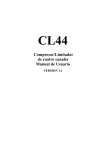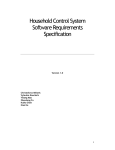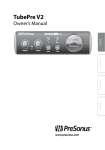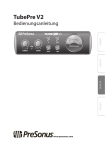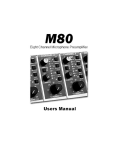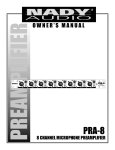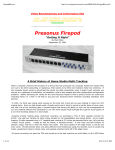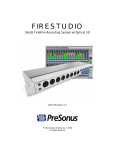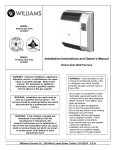Download PRESONUS TUBEPRE User`s manual
Transcript
TubePRE Single-Channel Tube Mic-Preamplifier w/ VU Meter User's Manual VERSION 1.0 Presonus Limited Warranty Presonus Audio Electronics Inc. warrants this product to be free of defects in material and workmanship for a period of one year from the date of original retail purchase. This warranty is enforceable only by the original retail purchaser. To be protected by this warranty, the purchaser must complete and return the enclosed warranty card within 14 days of purchase. During the warranty period Presonus shall, at its sole and absolute option, either repair or replace, free of charge, any product that proves to be defective on inspection by Presonus or its authorized service representative. To obtain warranty service, the purchaser must first call or write Presonus at the address and telephone number printed below to obtain a Return Authorization Number and instructions of where to return the unit for service. All inquiries must be accompanied by a description of the problem. All authorized returns must be sent to the Presonus repair facility postage prepaid, insured and properly package. Proof of purchase must be presented in the form of a bill of sale, canceled check or some other positive proof that the product is in within the warranty period. Presonus reserves the right to update any unit returned for repair. Presonus reserves the right to change or improve design of the product at any time without prior notice. This warranty does not cover claims for damage due to abuse, neglect, alteration or attempted repair by unauthorized personnel, and is limited to failures arising during normal use that are due to defects in material or workmanship in the product. Any implied warranties, including implied warranties of merchantability and fitness for a particular purpose, are limited in duration to the length of this limited warranty. Some states do not allow limitations on how long an implied warranty lasts, so the above limitation may not apply to you. In no event will Presonus be liable for incidental, consequential or other damages resulting from the broach of any express or implied warranty, including, among other things, damage to property, damage based on inconvenience or on loss of use of the product, and, to the extent permitted by law, damages for personal injury. Some states do not allow the exclusion of limitation of incidental or consequential damages, so the above limitation or exclusion may not apply to you. This warranty gives you specific legal rights, and you may also have other rights, which vary form state to state. This warranty only applies to products sold and used in the United States of America. For warranty information in all other countries please refer to your local distributor. Presonus Audio Electronics, Inc. 7257 Florida Blvd. Baton Rouge, LA 70806 225-216-7887 www.presonus.com i Limited Warranty Outside of The U.S. Presonus Audio Electronics products are warranted only in the country where purchased, through the authorized Presonus distributor in that country, against defects in material and workmanship. The specific period of this limited warranty shall be that which is described to the original retail purchaser by the authorized Presonus dealer or distributor at the time of purchase. Presonus does not, however, warrant its products against any and all defects: 1) arising Out of materials or workmanship not provided or furnished by Presonus, or 2) resulting from abnormal use of the product or use in violation of instructions, or 3) in products repaired or serviced by other than authorized Presonus repair facilities, or 4) in products with removed or defaced serial numbers, or 5) in components or parts or products expressly warranted by another manufacturer. Presonus agrees, through the applicable authorized distributor, to repair or replace defects covered by this limited warranty with parts or products of original or improved design, at its option in each respect, if the defective product is shipped prior to the end of the warranty period to the designated authorized Presonus warranty repair facility in the country where purchased, or to the Presonus factory in the U.S., in the original packaging or a replacement supplied by Presonus, with all transportation cost and full insurance paid each way by the purchaser or owner. All remedies and the measure of damages are limited to the above services. It is possible that economic loss or injury to person or property may result from the failure of the product; however, even if Presonus has been advised of this possibility, this limited warranty does not cover any such consequential or incidental damages. Some states or countries do not allow the limitations or exclusion of incidental or consequential damages, so the above limitation may not apply to you. Any and all warranties, express or implied, arising by law, course of dealing, course of performance, usage of trade, or otherwise, including but not limited to implied warranties of merchantability and fitness for a particular purpose, are limited to a period of two years from either the date of original retail purchase or, in the event no proof of purchase date is available, the date of manufacture. Some states or countries do not allow limitations on how long an implied warranty last, so the above limitations may not apply to you. This limited warranty gives you specific legal rights, and you may also have other rights, which vary from state to state, country to country. Presonus Audio Electronics, Inc. 7257 Florida Blvd. Baton Rouge, LA 70806 225-216-7887 www.presonus.com ii Table of Contents 1.1 Introduction........................................................................1 1.2 Features.........................................................................................2 2.1 Controls & Connections .......................................................4 2.2 Front Panel .....................................................................................4 2.3 Preamplifier Section .........................................................................4 2.4 Back Panel......................................................................................6 3.1 Operation ............................................................................8 3.2 Dynamic Microphones .......................................................................8 3.3 Phantom-Powered Microphones ..........................................................8 3.4 Instrument Input .............................................................................8 3.5 Some Thoughts on Vacuum Tubes.......................................................8 3.6 Application Guide .............................................................................9 3.7 FAQ/Trouble Shooting..................................................................... 10 4.1 Technical Specifications ....................................................13 iii 1.1 INTRODUCTION Thank you for purchasing the Presonus TubePRE Single-Channel Microphone/Instrument Tube Preamplifier. This pre-amp was designed using state of the art components to deliver crystal clear audio for an infinite period of time. We feel that we have created a reliable, versatile and affordable piece of audio equipment. It is designed to meet a multitude of professional audio applications. If you have any questions or comments in regards to this or any other piece of Presonus equipment, please fell free to contact us! Please pay close attention to how you connect your TubePRE to your system. Improper grounding is the most common cause of noise problems found in studio or live sound systems. We urge you to scan this manual before hooking up your TubePRE to familiarize yourself with its features and various applications. Good luck and enjoy your TubePRE! 1 1.2 Features The following is a summary of your TubePRE's features: Dual-Servo Gain Stage Your TubePRE contains a dual-servo gain stage (no capacitors). This provides ultra-low noise performance and wide dynamic control. This gives the TubePRE the ability to boost the desirable signal without increasing unwanted background noise. Phantom Power When the phantom power switch is engaged, power is supplied at a constant rate. This assures optimum performance of your condenser microphone and that the signal will be free of distortion due to insufficient power. Phase Reverse This switch enables the user to invert the phase of a microphone if phase cancellation is noticed when using identical microphones in close proximity to one another. The phase reverse switch can also compensate for different XLR connector hook-ups where pin connections have been inverted. -20dB Pad A -20dB pad is available for reducing the incoming signal level. This pad provides a more manageable signal from high output devices giving the operator greater control over the incoming signal and a much reduced chance of over-driving the input and thereby avoiding distortion. 2 80Hz Rumble Filter A rumble filter is available to eliminate low frequency noise. This lets you greatly reduce background noise from things such as air conditioners or wind noise with the flick of a switch without affecting the desired frequencies. Mic/Instrument Input The TubePRE has a separate XLR and 1/4” connector on the back of the chassis for signal input from microphones (XLR) or instruments (1/4”). Drive The TubePRE provides a Drive potentiometer for controlling the amount of signal routed to the 12AX7 vacuum tube. This feature lets you control the amount of tube saturation. Greater levels of tube saturation give the signal greater warmth and a richer sound. This works equally well on mics and instruments. 3 2.1 CONTROLS & CONNECTIONS 2.2 Front Panel The TubePRE front panel has the following features: Phantom Power Switch (+48v) Phase Reverse Switch Drive Control (0 to 20dB) -20db Pad Gain Control (0 to 40dB) 80Hz filter Backlit VU meter 2.3 Preamplifier Section Phantom power is available for the input of the TubePRE. The 48 volts are supplied through the XLR connector for condenser mics and any other devices requiring continuous power (through the XLR input). 4 XLR wiring for phantom power PIN 1 GND PIN 2 +48v PIN 3 +48v Phase Reverse Switch Allows the user to invert the polarity of the XLR connector by switching pins two and three. The inversion of the pins of the XLR connector may be necessary to alter the audio phase of two like microphones to compensate for phase cancellation. It may be required that the wiring of a cable’s XLR connector be switched to successfully utilize phantom power. -20dB Pad Provides -20 decibels of attenuation with the push of a button. This is a very useful feature for rapidly reducing the level coming into the TUBEPRE and thus preventing the input signal from distorting the input. This may occur due to a high output level from a microphone or line device. Padding the input provides increased “headroom” for the operator. Drive The TubePRE drive control increases the amount of signal routed through the 12AX7 vacuum tube. (The gain controls overall volume, whereas the drive controls volume routed through the tube.) The effect achieved by this procedure can be subtle to extreme, depending on the setting being used. A “warming up” of the sound can be noticed at lower settings. This desirable effect is especially good for microphones and on an electric bass and the resulting sound is 5 infinitely richer and sweeter. An overdriven signal can be achieved by significantly raising the level of the drive control. This overdriven tube effect is extremely useful in providing distorted guitar and for creating that authentic “blues harp” vibe (harmonica). The possibilities of the drive control are limited only to your application and your imagination. Gain This control governs the amount of boost to the signal being processed by the preamplifier. Dynamic mics and instruments without preamps normally require more gain than condenser mics and instruments that have a built-in preamp (care should be taken with instruments having their own built-in preamp not to overdrive the input of the TubePRE). Increasing the gain should provide the signal that is needed from the preamp for a hotter (louder) recording level. 2.4 Back Panel XLR wiring for input and output PIN 1 GND PIN 2 High (+) PIN 3 Low (-) The output XLR is balanced 6 1/4” phone plug wiring input and output TIP High (+) SLEEVE GND (-) The output 1/4” phone plug is unbalanced 7 3.1 OPERATION 3.2 Dynamic Microphones Lower output levels characterize dynamic microphones, so more gain is needed to achieve sufficient operating levels. Occasionally it is necessary to add the -20dB pad to the microphone to avoid distortion (e.g. when recording percussion). Do not use phantom power when using dynamic microphones. 3.3 Phantom Powered Microphones Phantom powered microphones such as condenser and some ribbon microphones require external power to preamplify the microphone. These microphones typically have much higher output than dynamic microphones. Therefore the -20dB pad is almost always necessary when close mic-ing to avoid clipping (overdriving) the preamplifier. 3.4 Instrument Input The instrument input is designed to handle 1/4” plugs from instruments such as guitars and basses. This instrument input is an ultra high impedance amplifier designed to allow the full audio potential of an acoustic or electric instrument pickup. Plugging a preamplified signal (line level) into the TubePRE is not recommended. 3.5 Some Thoughts on Vacuum Tubes The TubePRE comes supplied with a 12AX7 vacuum tube that meets or exceeds the stated performance criteria for the unit. We expect some owners of the TubePRE will try different tubes to investigate the various performance possibilities they might provide. Remember, tube life and performance are affected by how often a tube is used and by 8 how hard the tube is driven when in use. Signs of wear may be exhibited by poor performance or by the tube becoming “microphonic”. Periodic replacement of the vacuum tube is recommended. The time between the suggested replacements varies greatly with use. If you notice deterioration in sound quality then it’s time to change the tube. Replacing the tube in the TubePRE 1. Unplug the unit. Proceed with caution, as the tube could be hot. Remove the two screws from the top and the two screws from the bottom of the unit. Also remove the two screws that surround each of the XLR plugs. 2. Carefully remove the plastic hex nut that is on the unbalanced output and the instrument input. 3. Remove the left side panel. 4. Remove the black chassis. 5. Place your thumb on the backside of the card that holds the tube and carefully unplug the tube. 6. Align the pins of the new tube and place it in the socket with your thumb again on the back of the tube socket card. Make sure that the tube is completely seated in the receptacle. 7. Replace the chassis, side, hex nuts and screws. 3.6 Application Guide Direct Box The 1/4” and XLR outputs can always be used simultaneously. The instrument should be plugged into the 1/4” instrument input. The 1/4” output can be connected to an amplifier on stage and the XLR output could be connected to the PA system or monitoring mixer. 9 With a compressor/EQ/dynamics processor When running the Tube Pre in conjunction with other processors it is recommended that the TubePRE be the first unit in the chain. The other units should be connected to the output (either XLR or 1/4”) of the TubePRE. Most compressors require that the signal be preamplified before they are connected. This simply means that the signal is loud enough for the compressor to process it. In most cases (and there are exceptions) if you were to plug a microphone/guitar directly into a compressor the signal will be too low (essentially too quiet) for the device to process it. On Recording When using the TubePRE as a front end for a recording device (such as the Presonus FIREstation), it is important to watch your output levels. For example, using the TubePRE for distortion (turning up the gain and tube drive REAL HIGH) could overload the inputs of the recording device. In this scenario it is necessary to limit the output level of the TubePRE. This can be accomplished by using a compressor/limiter (such as the Presonus BlueMAX). 3.6 FAQ/Troubleshooting Can I switch the tube? The TubePRE’s tube can be switched as long as it is a 12AX7. Proper caution must be taken when switching the tube. Please refer to Section 3.5 of this manual for further directions on changing the tube or check our website at www.presonus.com. 10 If the voltage on the back of my TubePRE does not match the voltage listed on the power supply what do I do? The voltage on the TubePRE’s external power supply may change. If the power supply came factory sealed with the unit, then it is the right power supply. If the power supply did not come with the unit it is recommended that it not be used. If your power supply is damaged or missing, please consult your salesperson or call Presonus. Can I use a higher/lower/alternate voltage power supply that was not supplied with my TubePRE? Use of any power supply that was not included with the unit voids the warranty of the TubePRE and may cause damage to the unit or the user. It is strongly recommended that you refer any service issues to Presonus. Can the TubePRE be rack mounted? Yes, please consult your local Presonus dealer or www.presonus.com for rack mounting instructions and to locate the appropriate rack mount adaptor. Can I use a different size/style tube in the TubePRE? The only tube that can be used in the TubePRE is a 12AX7. Any variation can cause damage to the unit/user and voids the warranty. Please refer to Section 3.5 of this manual for further directions on changing the tube. It is strongly recommended that you refer any service issues to Presonus or check our website at www.presonus.com. 11 Can I plug my keyboard/CD player/etc into the TubePRE? It is not recommended that any LINE LEVEL items be plugged into the TubePRE. This scenario will not cause damage to the unit. However, it may cause the signal to distort or sound unpleasant. The reason is that the signal being fed into the unit is too loud for the TubePRE. This may cause the unit to distort (In some cases this may be the desired effect). Whenever I turn up the tube drive all the way my signal sounds distorted. Why is this? The tube drive feeds the signal into the tube. The more signal that is applied to the tube, the greater the chances of distortion. However, to some this sounds nice on guitar or other instruments. In certain applications the tube drive is not needed (for example, while recording books on tape). In other applications, the tube drive can be mixed with the gain to create desirable effects (think of the tube drive as extra gain with added equalization). 12 9.1 TECHNICIAL SPECIFICATIONS Preamp Bandwidth..................................................... 10Hz to 50kHz Number of Channels ................................................................. One Performance THD + Noise (Unweighted) ......................... 0.05% @ 0dB Tube Drive ................................................................. 10% @ 20dB Tube Drive Noise Floor ......................................................................... -94dBu Signal to Noise..................................................................... >90dB Power Supply Rejection ......................................................... >98dB Amplifier Type................................................................ Dual Servo Input Connectors ................................................................. XLR and 1/4” Input Impedance, XLR .................................................... 1.3k Ohms Input Impedance, High Z 1/4”......................................... 1Meg Ohms Output Output Impedance, XLR Balanced ........................................ 51 Ohms Output Impedance, 1/4”TRS Unbalanced .............................. 51 Ohms Panel Controls Tube Drive ................................................................ 0dB to +20dB Gain ......................................................................... 0dB to +40dB Phase Reversal - 20dB Pad + 48V Phantom Power 13 Metering VU Meter .............................................................. -20dBu to +3dBu Clip LED ............................................................................ +20dBu Power Supply Type ..................................................... Linear/External Transformer Input .....................................................................16 VAC/1000mA Power ............................................................................ 16 WATTS Physical Weight ................................................................................... 4lbs. Size .............................................................................. 1/3 U Rack Dimensions......................................................... 5.5” X 5.5” X 1.75” Mounting.................................................. Universal Rack Tray Insert Chassis ..................................................................................Steel Front Panel ......................................................... Brushed Aluminum Side Panels.................................................... Ribbed Cast Aluminum 14



















